This special topic derives from Calvin’s Little Book Chapter 5 on how the present life should be viewed. This is Chapter 10 of Book 3 of Calvin’s Institutes of the Christian Religion.
In his Ch 5, Calvin notes the slippery slope as this question of how to live in the near and now where to the one side falls extreme asceticism and withdrawal and to the other side beastial license even antinomianism.
The issue then, seeks for some “rule” of living, that can keep one on the middle ground, consistent with the teaching specifically of the New Testament (NT). We have addressed this beginning in Week #18 Calvin’s study here. In this page, we will pull together from Calvin’s thoughts in his Ch 5 the common theme and propose such a “rule,” more of a perspective of this life.
We Are Pilgrims
Pilgrims are on a journey. It does include stops, visits, and stays, but never truly “belonging” anywhere but on the journey to which they have been called. In the NT there are many “journey words.”
Status as a Pilgrim
One cluster of such words describes the nature of the traveler as given directly below.
parepídēmos (G3927) adj. from pará (3844), near or close to, and epídēmos (n.f.), stranger, which is from epí (1909), in or among, and dḗmos (1218), a people. A stranger, sojourner; not simply one who is passing through, but a foreigner who has settled down, however briefly, next to or among the native people (Heb. 11:13; 1 Pet. 1:1; 2:11; Sept.: Gen. 23:4; Ps. 39:12). Also from epídēmos (n.f.): epidēméō (1927), to reside as a stranger.
pároikos (G3941), alien, sojourner
apódēmos (G590), sojourner, living in another country
xénos (G3581), a stranger, foreigner
allótrios (G245), stranger
allogenḗs (G241), one of a different race.
Zodhiates, S. (2000). The complete word study dictionary: New Testament (electronic ed.). Chattanooga, TN: AMG Publishers.
Roads, Ways of a Pilgrimage
Another category of “journey words” relate to the road of travel itself, as given below (and note in particular the OT book “Exodus” means, literally, the ‘out’ (“Ex”) ‘road’ (“Hodos”)):
hodós (G3598) Way. (I) In respect to place, a way, highway, road, street. (II) In action, way, i.e., a being on the way, a going, journey, progress, course. (III) Metaphorically meaning way, manner, means.
éxodos (G1841), way out, exodus, an exit;
hodeúō (G3593), to travel, journey;
hodēgós (G3595), guide, leader;
párodos (G3938), a passing or passage;
sunodía (G4923), a caravan.
drómos (G1408), a race, running, career, course;
poreía (G4197), from verb poreúomai (4198), to go; A going away, a journey, venture (LXX Jonah 3:3). Course of manner of life (Jas 1:11; LXX 2:7)
poús (G4228), foot. Many occurrences, including combined with other words.
tríbos (G5147), a worn path;
trochiá (G5163), a track of a wheel;
tréchō (G5143), to run (intransitive), [many occurrences and uses, including the spread of the Word of God (2 Thes 3:1; LXX Ps 147:14)]
trópos (G5158), manner.
prókeimai (G4295), prokeímenos, from pró (4253), before or forth, and keímai (2749), to lie. To lie before, to be laid or set before someone. Intrans. (Sept.: Lev. 24:7). In the NT used only figuratively: (I) To lie or be before the mind of someone, to be present before him (2 Cor. 8:12). (II) In Heb. 6:18 prokeiménēs, equivalent to the perf. pass. of protíthēmi (4388), to set forth, “the hope that is set forth” (a.t.). See Heb. 12:1, 2; Jude 1:7, prókeintai, they lie before.
patéō; (G3961) from pátos (n.f.), a path, a beaten way. .
katapatéō (G2662), to trample;
peripatéō (G4043), to walk around.
Zodhiates, S. (2000). The complete word study dictionary: New Testament (electronic ed.). Chattanooga, TN: AMG Publishers.
Pilgrim as an Outcast
Yet another aspect of being a Pilgrim is that of being an outcast. In the Gospel of John in two adjoining chapters we have exactly this point illustrated. In John 3 we have the famous passage of a leader of TRI, a Pharisee by the name of Nicodemus, coming to Jesus by night with some questions. His name, Nicodemus, is the union of two Koine words, “nico” which comes from the word “victor” as in “winner,” and “demos” meaning the people. His very name goes with his TRI importance and, possibly TPI importance as well.
In John 4 we have another famous passage this time of a woman, in mid-day, not night, who is unnamed and an outcast from even the Samaritan people who in the eyes of TRI were outcast people as a whole. So the unnamed Samaritan women was truly at the bottom of any ordering of respectable people.
Unlike Nicodemus, was bound tightly with the established order, the Samaritan Woman was unbound, and unwanted, apparently even by the multiple men in her life. The Koine has of course words for “woman “and “man,” gunḗ (G1135) and anḗr (G435), respectively, but not distinct word for “wife” and “husband.” So when Jesus asked her “Go call your husband, and come here” (John 4:16), the word in the Koine is anḗr and the translators have interpreted this to mean “husband,” which is entirely plausible, but not necessarily so. Then when the woman replies that she has no anḗr (which again is commonly translated “husband”) Jesus commends her honesty and says that she had had five anḗr (plural) and the one anḗr she present has is not her “husband.” This could be understand that in ever case the best understanding is “man” not husband, meaning that she married none of the five, as well as not the current “man” with whom she is living. Another possibility is that her first anḗr was indeed her husband, but after divorce of separation or widowhood the rest were “men” not husbands. (I lean to the meaning of “man” / “men” in all six references, the five in the past, and the one then current). Whatever the case, one can conclude that this woman has been on the most-sad ‘journey’ through relationships, or more accurately, brief connections, of what God has designed to be the most-intimate, personal, and permanent relationships. One could say she was looking for true joy in all the wrong places or she was used for such by men, or some combination.
So she, dramatically unlike Nicodemus, though bound to a geographical and racial people, was a stranger and alien from them. This was why she was at the well at mid-day instead of when the woman of a village would customarily gather at the village well in the early morning, before the heat of the day. This woman was not welcome there and then. So her pilgrimage was a most painful one, and for all expectations one that could never be cured, or undone. She was a true outcast, but stuck in her own neighborhood where she was the recurring object of scorn especially by the women of the village, but unworthy of respect by the men. So it is likely that as her life went from “man” to “man,” it went downhill in some scale of measure of the quality of the men, as each succeeding one would have recognized her history and villages then, as know, are such that everyone pretty much knows everything, especially regarding the norm-breakers.
And, so, those who left the confines of the Jewish practice of the Mosaic Law were likewise outcasts in their own neighborhood because they reject TRI, and in particular TRI that had a recognized and privileged position within the Roman Government, TPI. Yet, the Roman TPI did not ‘welcome’ Christians any more than they did the Jews. In fact, such Christians became a particular object of persecution because they fell outside of the circle of tolerance that the Romans had carved out for the Jews who practiced monotheism, and rejected Roman paganism and polytheism.
Given below are outcast-related Koine words used in the NT:
The Epistle of 1st Peter begins with three identifying words of pilgrims as outcasts as shown in the below image:
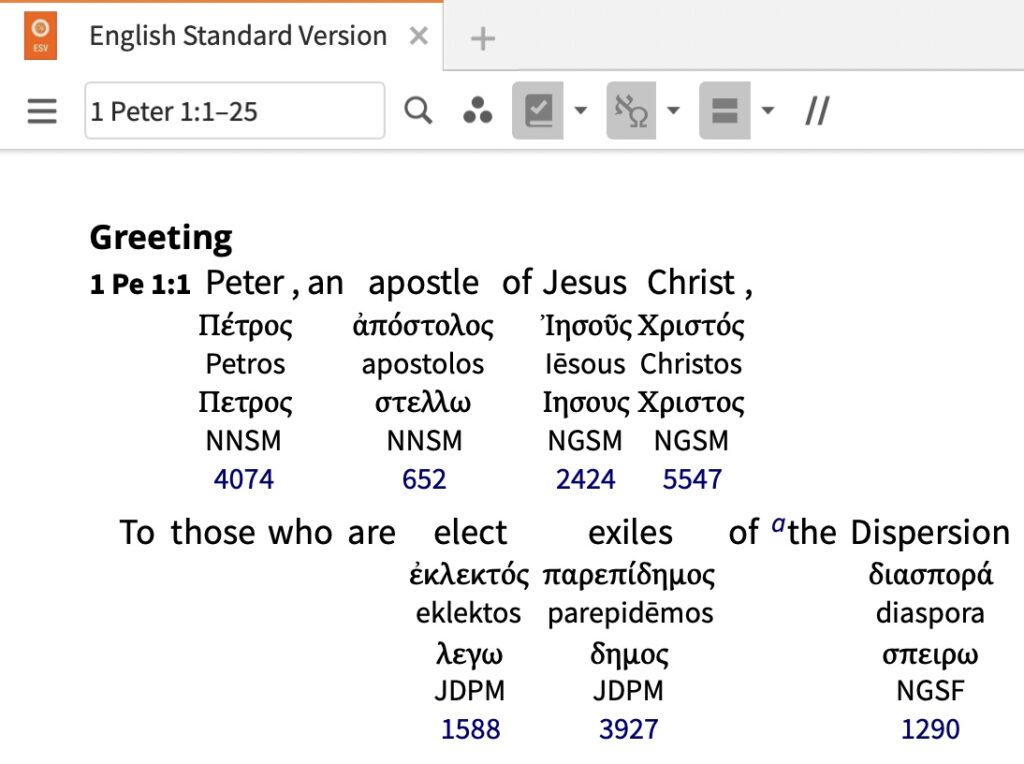
Although the Epistle of 1 Peter had a specific audience of “elect exiles of the dispersion,” namely those (primarily) Jews located in various regions of Anatolia presently known as Turkey. This very extensive country connects Asia with Europe at its western boundary at the city of Constantinople (presently Istanbul). It’s Western area is where the seven cities of the Book of Revelation (Ch 1, 2) were located and the recipients of two important NT Epistles (Ephesians and Colossians). It was the territory of Paul’s Missionary Journeys which included the central region of Galatia, and the two years Paul was the teacher-in-residence ministering the Word (Ephesus). The Apostle was a native of Celicia a city in southwest Anatolia.
After the two defeats and exiles recorded for us in the Old Testament (OT), first by Assyria and then by Babylon, the Jewish people were subsequently scattered throughout the known world, with only a remnant returning to “Israel” as permitted by the Persian King Cyrus the Great. In time, Israel regrew as a populated area but remained under the political-military control of other nations, first Persia, later the Greeks, and ultimately the Romans.
Within the broad territory of Anatolia, as throughout the known world. Jewish gatherings known as synagogues arose, a term never used in the OT. These synagogues were outposts of Judaism, and holders to the customs and practices of the Mosaic Law. By the nature of tribal divisions, such centers of Jewish people were more than mere places of worship: they were the familiar, community, and economic nucleus of all Jews of that immediate region.
After Pentecost, in ca. 30 A.D., the time of the next generation to the destruction of the City of Jerusalem and its Temple and the Holy of Holies, all these areas became centers of turmoil as we see in the Book of Acts. There were Gentiles turning to God through Jesus Christ and, so, embracing also the Old Testament (which the Jews saw as simple their “bible,” books). Further there were racial Jews and proselytes (Gentiles who had converted to Judaism) in these communities who also became followers of Jesus Christ. As we can see through the Book of Acts and especially in the denouement of Acts, there was vehement opposition to such message of Grace in Christ driven largely by such message claiming to be the complete, genuine fulfillment of the OT and the requirements of the Mosaic Law. The traditional Jewish practice was to abhor the Gentile people on religious grounds, but also social and racial grounds. That was a given norm that was a permanent layer of hatred for 1500 years, going back to the time of the Exodus. What was new, and in a sense even more offensive, was direct challenge to such traditional view of the importance and work of the Mosaic Law, especially by peoples who had been born and were racially Jews themselves. This led to the intense conflict we can see in Acts, but also in the Epistles to the Galatians and Hebrews, and in the so called “General Epistles” including First and Second Peter, James, and Jude.
What is relevant here and to us is that such condition of being dispersed exiles as ascribed by the above image from 1 Peter 1:1 is that although there was a near-term context to Peter it exactly typifies how TRI has (ultimately) treated followers of Jesus Christ. From time to time there are forms of accommodation, and attempts at syncretism, these cannot endure. The claims of Grace in Christ are fundamentally incompatible with the practices of TRI (all this a much broader subject than can be addressed here). The result is that followers of Christ become exiles from north TRI and even TPI when it forms itself into religious structures as it does with historical regularity.
And, so, the addressees of the above clip from 1 Peter 1:1 is us, in some form. We might in certain circumstance become geographical outcasts to avoid torture and martyrdom as were many examples during the Reformation period including Tyndale who fled England for the Continent because his translating the Bible from its original languages into English was deemed a crime against both TRI and TPI of England; ultimately he was captured where he worked in hiding, taken back to England, garroted and burned at the stake. Luther similarly survived in hiding, protected by a German prince from the Roman Catholic embodiment of TRI. There were many others including the St Bartholomew Day Ejection of 1662, and its later Five Mile Act of 1665, a subject worth researching.
In other circumstances the explosion and exclusion manifests by more subtle forces of power, judgment, and disdain. Sometimes within individual families it can extend to a form of expulsion and even hatred, disowning.
The relevance here is that by external circumstances, be they relatively benign (though hateful and painful) or extremely murderous, we become Pilgrims in one way, or form, or another.
Koine NT words that relate to various aspects of being such exiles are given below:
parepídēmos (G3927) adj. from pará (3844), near or close to, and epídēmos (n.f.), stranger, which is from epí (1909), in or among, and dḗmos (1218), a people. A stranger, sojourner; not simply one who is passing through, but a foreigner who has settled down, however briefly, next to or among the native people (Heb. 11:13; 1 Pet. 1:1; 2:11; Sept.: Gen. 23:4; Ps. 39:12). Also from epídēmos (n.f.): epidēméō (1927), to reside as a stranger.
Zodhiates, S. (2000). The complete word study dictionary: New Testament (electronic ed.). Chattanooga, TN: AMG Publishers.
pároikos (G3941), alien, sojourner;
apódēmos (G590), sojourner, living in another country;
xénos (G3581), a stranger, foreigner;
allótrios (G245), stranger;
allogenḗs (G241), one of a different race.
διασπορά diasporá (G1290) noun from diaspeírō (1289), to scatter abroad. A scattering or dispersion, spoken of the state of dispersion in which many of the Jews lived after the captivity, in Chaldea, Persia, and chiefly in Egypt, Syria and Asia Minor (Sept.: Jer. 34:17). In the NT, it refers to the dispersion of the Jews (James 1:1; 1 Pet. 1:1). In John 7:35 “the dispersed among the Gentiles” means the Jews dwelling either among the Gentiles generally, or among nations that used the Greek language, e.g., in Egypt and Asia Minor, the Hellenists (Sept.: Ps. 147:2).
Ibid.
Pilgrims as Ones “Called Out From…”
The TRI seeks our banishment, condemnation. And we are not welcome within TPI except as to our responsibilities for payment of taxes, and our honoring it.
But there is another side of such exclusion, namely that we have at the same time been “called out” of TRI and to the extent of its claim of intimate allegiance even TPI.
Even our very important words “Elect“– eklektós (G1588), eklogḗ (G1589)–and “Church“–ekklēsía (G1577), literally “called out ones–begin with the prefix “ek” (in English becoming “ex-“) which means “out from” (just as our common word “exit” is “ex-” + “it”).
eklektó (G1588) from eklégō (1586), to choose, select. Chosen, select. In the group of three important biblical words, eklektós, eklégō, and eklogḗ (1589), choice or election, selection involves thoughtful and deliberate consideration.
(I) Select, choice, elect. Used as an adj. in regard to stone as in 1 Pet. 2:4, 6 quoted from Is. 28:16; see Ezra 5:8. In both of these instances the stone is the Lord Jesus Christ as the one chosen of God the Father to accomplish the work of redemption for sinful man. Of persons, chosen or distinguished as in 1 Pet. 2:9, génos eklektón (génos [1085], generation), “a chosen generation,” referring to the believers in Christ. See Sept.: Is. 43:20. Of angels in 1 Tim. 5:21, referring to them as chosen by God to minister to the special needs of believers.(II) By implication meaning chosen, with the accessory idea of kindness, favor, love, equivalent to cherished, beloved. In Luke 23:35, the enemies of Christ around His cross said, “Let him save himself, if he be Christ, the chosen of God,” which means the one cherished and beloved of God and who was selected to accomplish the work of salvation for others. In Rom. 16:13, referring to Rufus, “the chosen one in the Lord” (a.t.), meaning the beloved one as in the previous verse referring to Persis…. The word is used to differentiate those who believe in Christ from those who do not. They are Christians because God chose them from among the lost world to become His followers.eklogḗ (G1589) noun from eklégō (1586), to choose, select. Election, choice, selection.
(I) Generally as in Acts 9:15, a chosen vessel, an instrument of usefulness.
(II) Election, the benevolent purpose of God by which any are chosen unto salvation so that they are led to embrace and persevere in Christ’s bestowed grace and the enjoyment of its privileges and blessings here and hereafter…
There are two Gr. words that need to be examined in their interrelationship: klētoí (2822), the called ones, and the eklektoí (1588), the chosen ones. No one can be a chosen one unless he is a called one. The initiative always comes from God. In Matt. 20:16; 22:14 the words of Christ are “For many are called, but few are chosen.” These two terms seem to be coextensive, as two aspects of the same process, klētoí, the called, having special reference to the goal, and eklektoí, referring to the starting point. The same persons are “called” to Christ and “chosen out” from the world. All are called by Christ: “Come unto me, all ye that labor and are heavy laden, and I will give you rest” (Matt. 11:28).ekklēsía (G1577) noun from ékklētos (n.f.), called out, which is from ekkaléō (n.f.), to call out. It was a common term for a congregation of the ekklētoí (n.f.), the called people, or those called out or assembled in the public affairs of a free state, the body of free citizens called together by a herald (kḗrux [2783]) which constituted the ekklēsía. In the NT, the word is applied to the congregation of the people of Israel (Acts 7:38).
Zodhiates, S. (2000). The complete word study dictionary: New Testament (electronic ed.). Chattanooga, TN: AMG Publishers.
The immediate above “ek” words each convey the meaning of “out from” something. What is that something?
- Self, self-reliance, personal agenda / mission, self-justification / self-righteousness, “pride of life”
- The Religion Industry (TRI) which provides means, and ends, for all of the above “self” inclinations, plus its own “self” inclinations, particularly of the persons claiming TRI authorities such as “priests,” people called “father,” people claiming to be “the bishop,” etc.
- The Political Industry (TPI) which goes beyond the necessary utility of shared expense for shared essentials professionally managed to such ends, and which TPI likewise has emerge people who claim authorities and centralized “values” beyond which they are entitled.
- Entertainment, broadly speaking, extending beyond the customary “lusts of the eye” and “lusts of the flesh” to becoming a black hole of ones time and attention, and ultimately becomes a the very end / objective of an all encompassing value system.
Markarios: The Blessedness of our Separation
There are two Koine words that are translated “blessed” and “blessedness.” One is the Koine word that transliterated is our English word “eulogy,” which means, literally, good (“eu”) words / speech / oratory (“logos”); it’s what we do at funerals when everyone attempts to frame the deceased’s totality-of-life-now-ended with positive, uplifting thoughts.
The other Koine word from which we get “blessed” does not have a direct English counterpart nor is it easily translated by any single word or even phrase. This Koine word is “makarios.” It is an extremely important word that headlines key passages in the Bible.
- It is the very first word of Psalm 1, and so of the entire Book of Psalms: “Makarios” is the man who…”
- It is the first word of each of the nine phrases that begin His ‘Sermon on the Mount:’ “Makarios” are the poor in spirit, …” (Matthew Ch 5)
- It is the word the Lord uses of the understanding that His disciples had of His Being in contrast to that of TRI. (Matthew 11:6; 13:16)
- It is the word that the Lord uses to characterize Peter’s ‘Great Confession,’ in answer to the Lord’s Question “Who do you say I am?” with the most crucial reply possible “Thou are THE CHRIST!” To which the Lord replies: “Makarios are you, Simon Bar-Jonah! For flesh and blood has not revealed this to you, but my Father who is in heaven.” (Matthew Ch 16).
- It is the shout of the crowds upon the Lord’s entrance into Jerusalem at the time of the final Passover (before they would later shout, at the insurrection and command of TRI to “crucify” Him!): “Makarios is He who comes in the the name of the Lord!” (Matthew 21:9).
- It is the keyword that we, our Christian fellow-pilgrims, will say upon His Return (Matt 23:39).
- It is what the Lord will say os us as faith servants (Matt 24:46) and upon our welcome into our inheritance of the Kingdom “prepared for you from the foundation (katabolḗ, G2602) of the world (kosmos, G2889)” (Matt 25:34).
A useful, summary definition of makarios is given below:
makários (G3107) adj. A prose form of the poetic mákar (n.f.), blessed one. Blessed, possessing the favor of God, that state of being marked by fullness from God. It indicates the state of the believer in Christ (Matt. 5:3–11, “Blessed . . . for my sake”; Luke 6:20–22, “Blessed . . . for the Son of man’s sake”), said of one who becomes a partaker of God’s nature through faith in Christ (2 Pet. 1:4). The believer is indwelt by the Holy Spirit because of Christ and as a result should be fully satisfied no matter the circumstances. Makários differs from the word “happy” in that the person is happy who has good luck (from the root hap meaning luck as a favorable circumstance). To be makários, blessed, is equivalent to having God’s kingdom within one’s heart (Matt. 5:3, 10). Aristotle contrasts makários to endeḗs (1729), the needy one. Makários is the one who is in the world yet independent of the world. His satisfaction comes from God and not from favorable circumstances. Deriv.: makarízō (3106), to declare blessed.
Zodhiates, S. (2000)
Syn.: eulogētós (2128), blessed, well–spoken of; eulogēménos, blessed; eulogéō (2127), to eulogize, bless, thank.
What must not be missed with respect to “makarios” and all the contexts of our being ‘called out,’ is that such is in the context of some form of suffering even if only the unpleasantness of disengagement from the world (kosmos) system that surrounds us (e.g., TRI and TPI), and even the economic realities of providing our necessary sustenance. Markarios is not about ‘our best life now’ in the earthly prosperity context in which the phrase is used. Makarios is indeed about a ‘prosperity,’ but it’s one that is outside of spacetime, and our normal human imagination or conception, and is the most ultimate, final, and even eternal prosperity of being forever in the presence of God. It is our being called back to that union that we, as the image of God’s Creation had at the beginning, but with a maturity of understanding certain realities of the true fallenness of the world system and the incredible reality of amazing Grace. We, thereby, have attained to the real knowledge of that tree of “knowledge of Good and Evil,” whereby “The Good” was inconceivable until the fullness of “The Evil” was fully expressed even, especially, unto the very rejection, killing, crucifixion by the combined passions of TRI and TPI, and which to their horror actually produced the very “Good” they were seeking to extinguish, as servants of the Serpent himself has been working to do, day and night, since that first question of Eve: “Yea [You, Eve], hath God said…?” (Gen. 3:1, KJV)
baínō βαίνω
Another important “journey word” that deserves special mention is the simple-to-pronounce and spell: baínō. Baínō never occurs as a standalone word in the NT (hence it has no Strong’s number), though it does in the LXX (e.g. Deut. 28:56), but is used in many places as part of a more complex Koine word and expression.
Baínō means (roughly) “foot,” but in a special sense. It is closely related to basis from which we get the like English word meaning, logically enough, “foundation”, or “grounds of:”
básis; (G939) fem. noun from baínō, to go, tread. A basis, base or foundation from its steadiness (Sept.: Ex. 30:18). The sole of the foot, or in a more general meaning, the foot of a man, which is, as it were, the basis on which he stands or goes (Acts 3:7).
Zodhiates, S. (2000). Ibid.
The NT testament book we know as “Acts,” or the “Book of Acts,” and sometimes as “The Acts of the Apostles,” would be better titled, in my view as “The Book of baínō.” (I actually do not know whether the extant title we have for “Acts” comes directly from the Koine mss, and so is inspired, or whether it was the consequence of an early copyist).
Here’s my evidence for such claim to retitling “Acts.” In the below pdf are the occurrences of baínō (and its direct relatives) which are embedded in numerous other Koine words in many passages in Acts alone.
Additional background on the meaning of these various occurrences of baínō is given below:
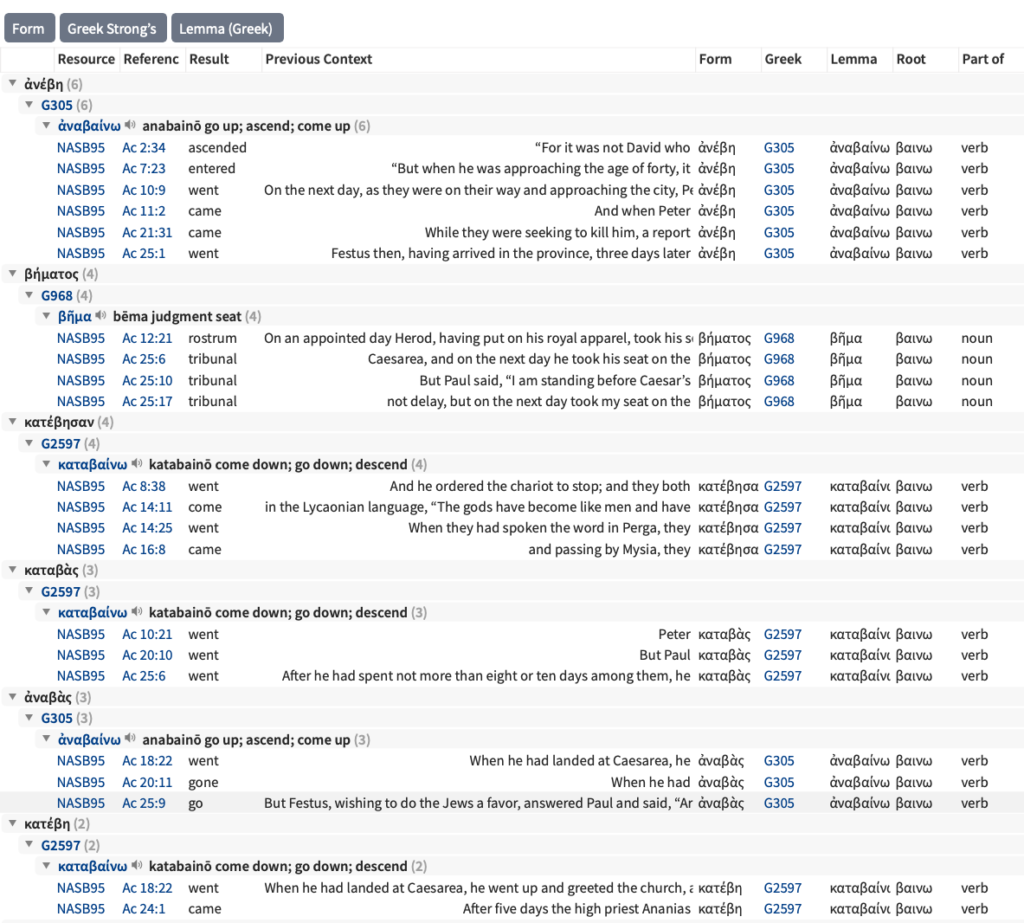
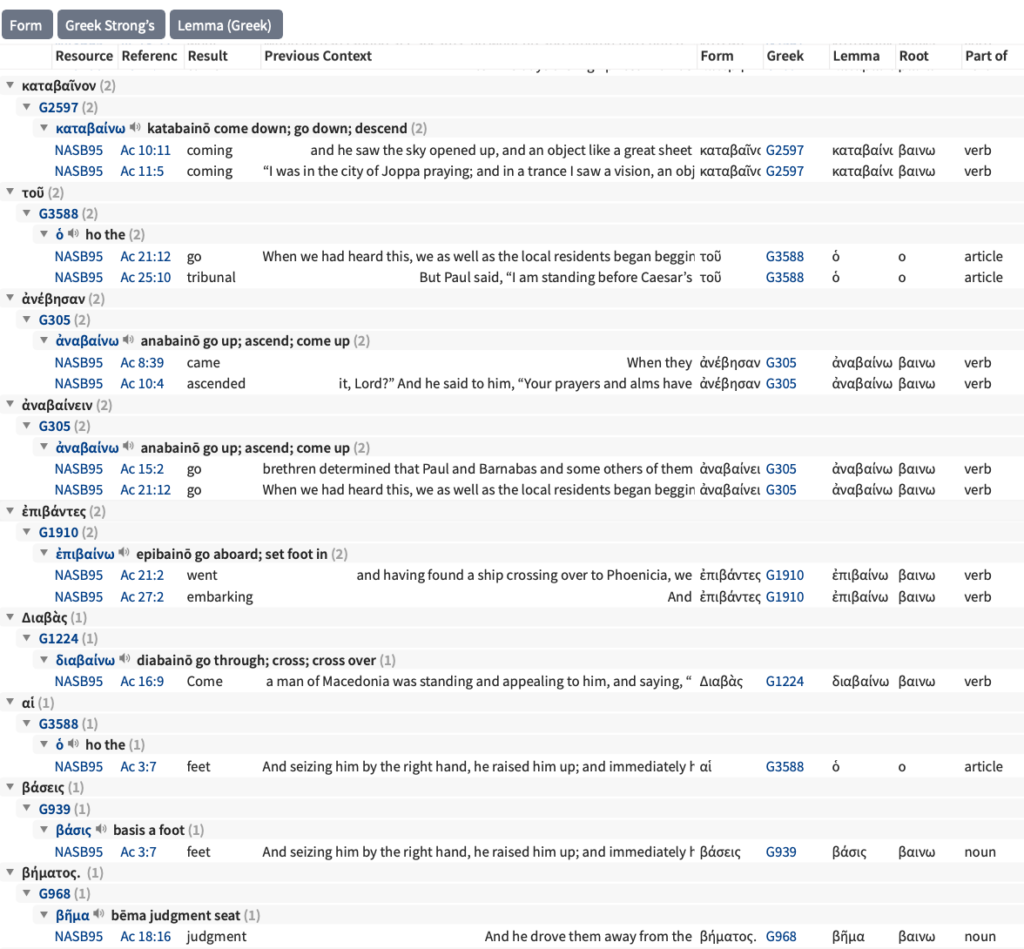
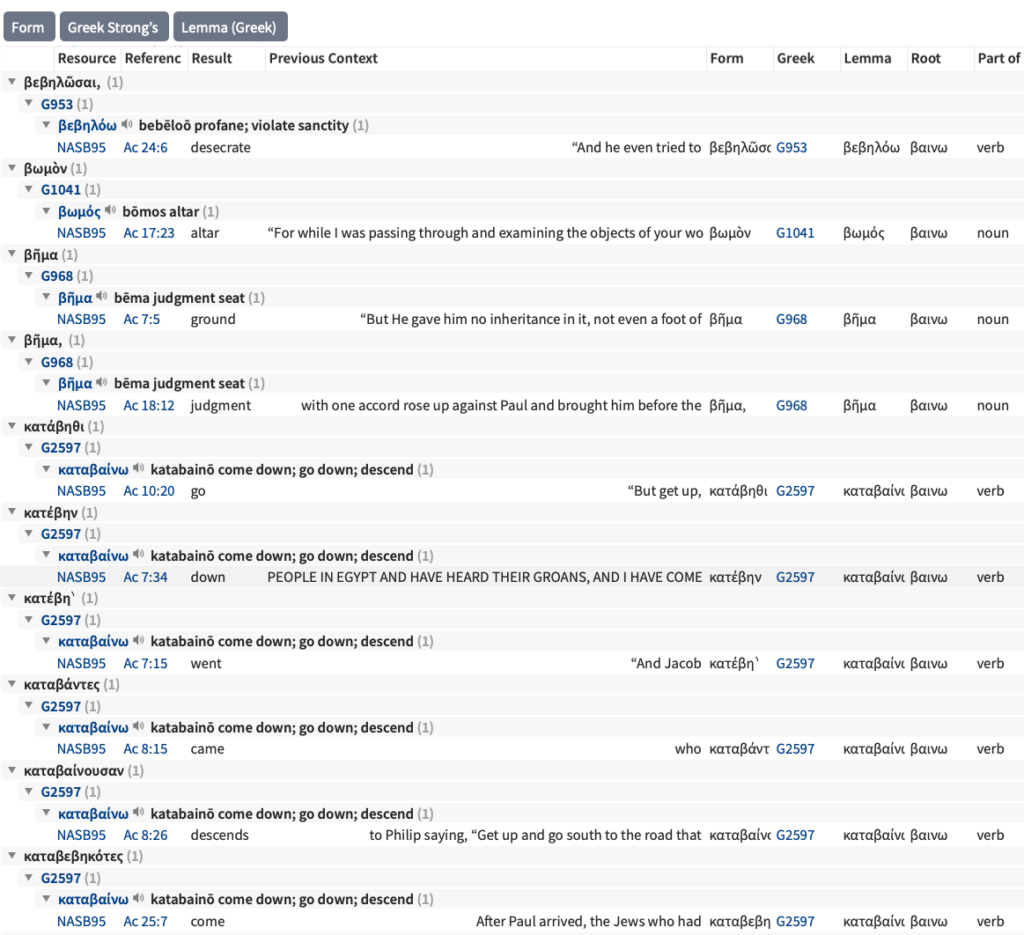
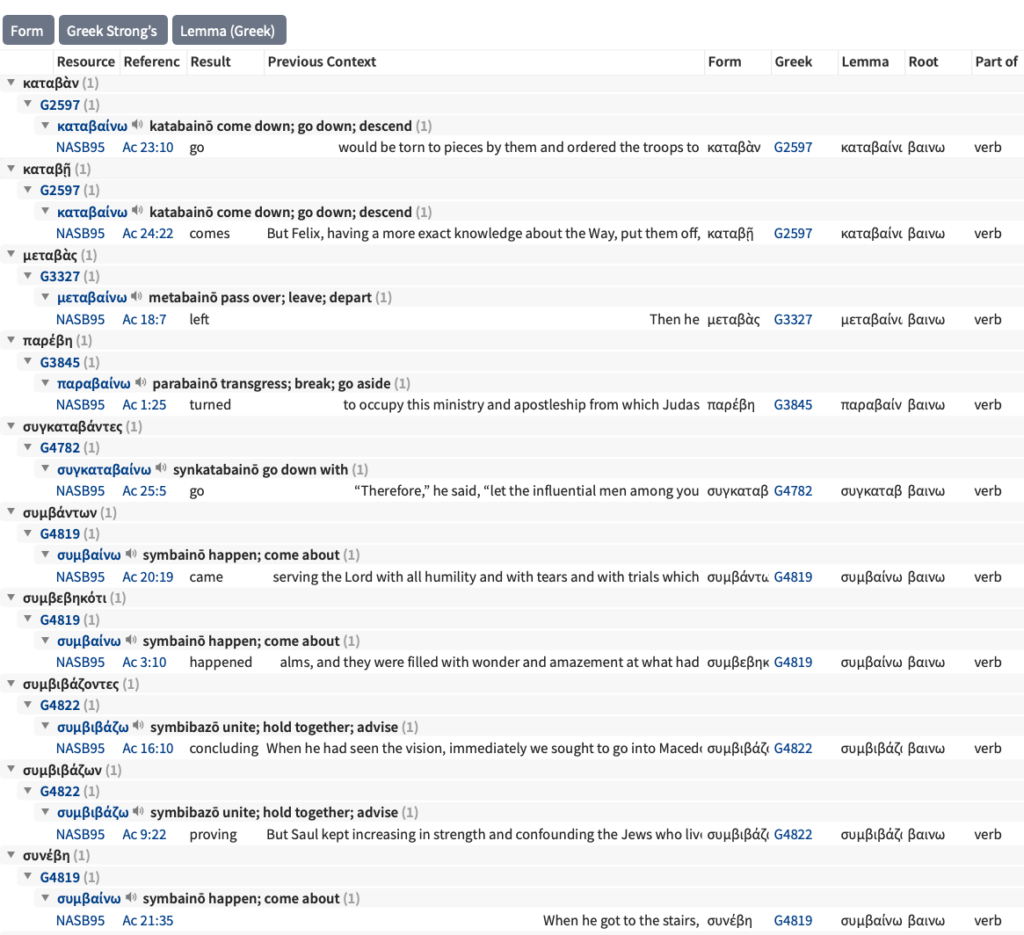
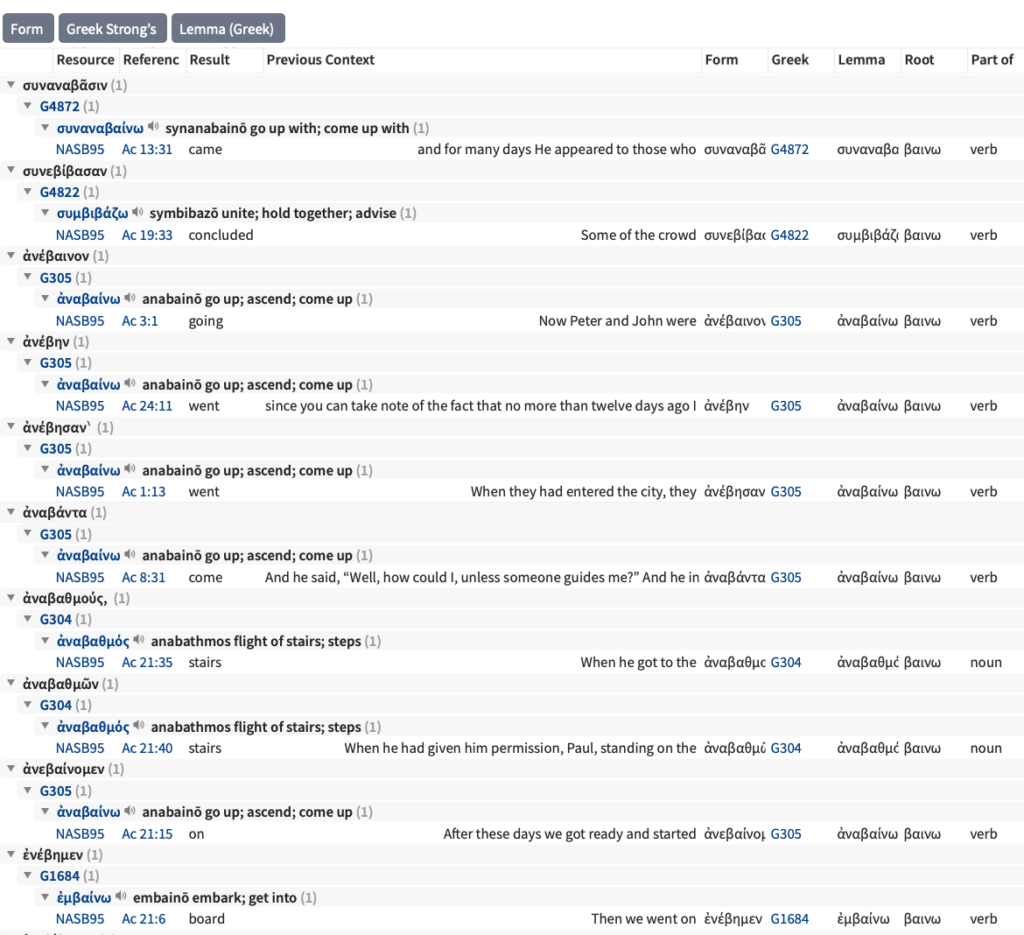
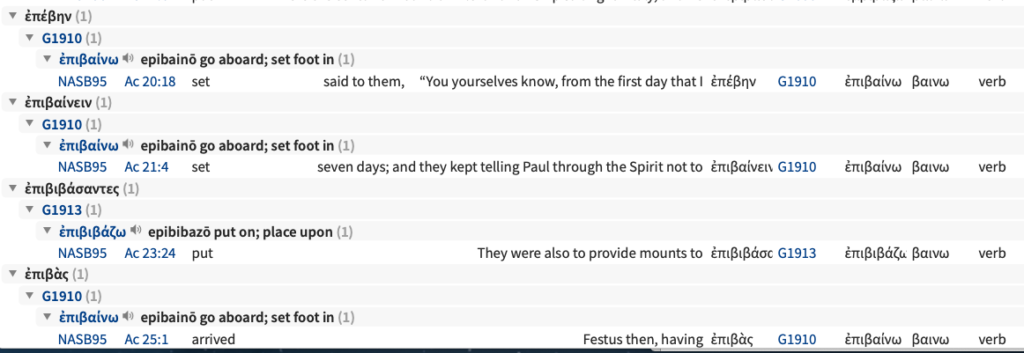
The takeaway point from the above many details is this: in exactly the same way the Lord Himself journeyed about Israel presenting Himself as Messiah, mirrors in a certain way His much more massive, and incomprehensible ‘journey’ from Infinite-Eternal into finite spacetime, and in another way how His Word spread throughout space and time, and peoples, in the NT period, and so it has continued to this very day. Once Adam (our federal representative), and Eve, were cast out of the Garden in Gen. 3, they were not longer ‘home,’ nor in the direct apprehension of God their Creator. They were not, on the other hand, completely plagued as wanderers, as was their first born son, and murderer, Cain who was condemned to the “Land of Nod” (which word means, literally, to no fixed place). Rather Adam (and Eve) were to spread out, fill the earth with their descendants, subduing it in the process (but as a responsible steward, not a looter / vandal). Such spreading out was, in effect, an endless journey, just as Abraham’s example being called out the major “river value civilization” (RVC) of the East, in the Mesopotamian Valley, to the Land (then) of Canaan, and unto Egypt, the major RVC of the West, and back again to Canaan. And we have the example repeated in the life of Jacob, and in David, and many of the OT prophets. And, so, we see it in the Book of Acts (or, of baínō), and so we see it now.
This movement also mirrors the even more difficult journey we each have had, and continue to have, in coming to faith, and pursuing our called course, neither of which would have been possible or our inclination but for the Grace and Calling of God.
Our Present Life as Pilgrimage
One of the most important books of the past 500 years is John Bunyan’s Pilgrim’s Progress. It was written by Bunyan while a prisoner of the TPI and TRI in England in two parts, 1678 and 1684. He was in prison not as an ordinary criminal, but as one who sought to preach the Word of God from the Word of God, not by the circumspection of TRI. It is no accident that prisoner Bunyan understood something very deeply about being a pilgrim outcast from the world system. Since its original publication it has been re-published countless times more than three centuries since and translated into almost every language on earth. In the humble homes of people who only had two books, the first would have been the Bible, the second Pilgrim’s Progress, with the latter likely the earliest reader of the children.
Bunyan’s book is available in multiple printed forms in any bookstore, by electronic book form, and by free pdfs. Since the very earliest editions extending to the present they have been published with touching illustrations.
What is it about Pilgrim’s Progress that has made it so important? I think the answer begins with the two words of the title: it’s about a Pilgrim–in the first book a man named Christian, in the second book it is his wife Christiana and their sons–and its about a journey, a progression. Those twin ideas captures the essential feature of this life, is the central spirit of Calvin’s Ch 5, and is the theme of the New Testament in contrast to the Old Testament. In the OT, the central design element was the centrality of the place where the Holy of Holies stood, where the festivals, ceremonials, and sacrifices occurred, where the people waited for the true Messiah / Redeemer / Lamb of God. Once that happened, in fulfillment of all the OT’s prophecy and imagery, the theme changes from central location based to a journey home, made crystal clear by God’s use of the Roman Legions to utterly destroy Jerusalem, the Temple Mount, the Temple, the Holy of Holies itself (70 A.D.).
Three Books
The theme of a journey is contained throughout the entire NT, though in a sense hidden there. When the Lord appears in spacetime, one might think that He, like the greatest of all possible Caesar’s and Kings, would sit in utmost magnificence on the throne of the world in complete inaccessible splendor before Whom everyone would prorate themselves. But the opposite was the case.
The Lord was born ‘on the road,’ in a town (Bethlehem) a long journey away from His earthly ‘home’ (Nazareth), neither of which was the central location of Israel / TPI (Jerusalem), nor was it of the central authority of Rome / TRI (Caesarea on the Israel coast, or of course Rome itself in what we know to be Italy).
Further, the Lord’s entire public minister was a traveler, a picture of a Pilgrim, and an outcast of TRI, and ultimately at the very end, a condemned ‘man’ by TPI.
Then, what? We have the Book of Acts which is in its entirely a Pilgrim journey. Then we have all the Epistles which are in scattered locations, having been reached in one way or another by Pilgrim Apostles. It isn’t until the Book of Revelation that we begin to see the great ingathering, and central resolution of all of the dispersion of spacetime, ultimately into the creation of a New Heaven and Earth.
There is a deeper significance to such NT journey imagery and that is the inner journey, between one’s ears and the connect with the heart and mind, that we each must go through. So we see in Nicodemus that he undertook a physical journey to see Jesus, but we do not see that he underwent that inner journey to “see” who he was seeing physically. We then see the immediate contrast with the Samaritan woman at the well. She made no physical journey to see Jesus as she was on her normal daily route and there He was, sitting by the well. However, we see the beautiful imagery of her making an inward journey of grasping Who Jesus really was.
That twin portrayal of physical verse inner journeys is then narrated for us by example after example throughout the rest of the NT.
I have written and self-published a book entitled Three Books. The books are the Gospel of John, Acts, and Romans, the three books that flow in sequence in our Bibles, with highlighting of the texts by distinguishing the physical journeys with the inner, spiritual journeys are taking place.
Resources supporting Three Books are available here: The physical books are presently out of print (all of the originally printed copies have been given away, save my own).
Life by Pack
We all know the experience of the walk around the block, or in the park, or to class or work. But a difference occurs when it’s a “hike” somewhere. For a “day hike” we would take a small “pack” with the essentials, as we see them, for a few hours, perhaps just water and a snack. For an “overnight hike” it’s more complicated as “necessity” may require a tent, or hammock, sleeping bag and pad, a toiletry kit, and so forth. For a “backpacking trip” such as a week or more, the list gets longer, the pack gets bigger, and we begin thinking more carefully about (1) what is truly “necessities” and (2) what are taking, or not taking and should be taking, that contributes to the peculiar enjoyment / purpose of such hike.
Then there are backpacking trips known as a “thru-hike.” Such a thru-hike is backpacking trip that extends end-to-end of a significantly long trail, one for which the duration cannot be exactly known, because of the distance involved and matters of weather, personal exhaustion, equipment breakdowns, and so forth. In the United States well-known thru-hikes include the Appalachian Trail (the AT, as it’s known, 2189.1 miles, exactly), the Pacific Crest Trail (PCT, 4271 miles), the Continental Divide (3100 miles), the American Discovery Trail (6800 miles), and many others.
Then there is “bike packing,” as with pedal bikes. These are different than hike-packing as the loads that can be carried are greater, the distances that can be covered further, and by the repair / maintenance tools and parts wisdom and practice requires.
Then there is “motor biking” as travel by motorbikes. Here the load carrying ability is even greater, accompanied by mechanical complexity, tools, and the need for spare parts, and of course the speed and possibility of extremely long distances including “Round the World” (RTW rides).
Finally there is “overland travel” typically by all terrain vehicles, often to desolate far flung exotic locales, and as part of RTW experiences. Here, again, load carrying capabilities increases further but as does the mechanical and electronic complexities.
What is interesting to us about each of these ‘life by pack’ examples is that such travelers must think carefully about both the “necessities” and the experience “multipliers” of the travel being planned. Too much, or too little, of either “necessities” or “multipliers” becomes a bad thing, even a very bad thing.
The Great Discarding of ‘Necessities’
Continuing with the metaphor of travel by pack one of the universal experiences is the discarding what was originally taken, deemed as “necessities,” but were soon found neither to be such, being the very opposite of helpful they were only burdensome.
Have you not had this experience? You packed and packed for some journey, making choices, finding containers, stuffing them full, getting more containers, actually buying more stuff, and yet thinking of yet more stuff until finally the exhaustion of time before needing to leave saves you from an endless gathering.
If you were carrying such on a backpack, you found it heavier than you possibly imagined. But the enthusiasm of those first steps on the trail you begin with a naive optimism. Yes it’s a great burden, but at least you have everything you “need.” Usually by the end of that first or second day of travel–sometimes by midday of that first day–you conclude that this cannot be endured, survived. What then? For some, they literally turn back, vowing to never backpack again. Others may begin to make a little pile alongside the trail with a small lettering of “free,” or offers to other hikers that pass by. The most common outcome is that at the first little store encountered there is a discussion with the proprietor who knows already your request. “Yes” they say, “we can box and ship this to your home for you,” at a mind numbing cost of postage. That leads to another inspection your pile of discarded ‘necessities’ as to their intrinsic worth compared to the substantial cost even of the simple postage to return to where you first extracted it. And, in turn, that often leads to some version of the 80:20 split, whereby 80 percent is offered to a giveaway (or throwaway) pile, and only some 20 percent is found to be worthy of postage.
Alas, that is not the end of the discard of ‘necessities.’ That was only your learning from the first couple of days of travel. Usually there are two more discard episodes as the days wear on and the true value of ‘necessities’ as a principle emerges. (Along the way, you get leaner as well–another inner blessing of the travel).
There are many quite funny, and some very touching, stories of such paring down. And it does not only occur with backpacking. Bikepacking, motorbike-packing, and even RV travel camping have very similar experiences though of varying degrees of intensity and timing. If you are a traveler, a journey-person, a pilgrim, the idea of “necessity” gain an emergent meaning that only a fellow traveler understands, and which becomes a shared experience.
The Great Need for Sources / Occasions / Opportunities of Joy, Meaning
Travel by pack is not about optimal necessities. Life is more than necessities, though they are (some of them, some of the time) necessary. Calvin’s Ch 5 makes the important point that beyond and distinct from necessities are, from his Latin word–oblectamentum–which has a rich semantic range of meaning:
- Delight
- Pleasure
- Enjoyment (note: “in” the state / condition of “joy”)
- Recreation (note: “re” [again] “creation”)
The Latin word helps us think more deeply than a simple English word such as “pleasure,” which can, at first glance, lead to shallow thoughts. The idea here is something deeply satisfying, enriching.
The Pilgrim’s Pilgrimage is not a grimace of endless pounding the pavement, mindless head-down grinding ever forward. It can be that, especially in certain seasons of life. But God intends us to have a particular, and I would say peculiar (that is to us as individuals), experience of deep joy and satisfaction.
So what is in my pack that is beyond (real) necessities?
Real Physical World Pack-Travelers
in the below pdf, I have collected several images of keys to success in physical world pack-travelers, using primarily examples from motorbike adventure travelers, with additional points from the world of backpackers and even the famous long-distance plane and pilot, Charles Lindberg. I could easily add another important example category that of pedal bike-packing. Finally I would note another area in which I had direct experience, sending men to the moon of the Saturn Apollo missions of 1960-1973. In every one of these examples there was the central battle of determining the “necessities” and the “oblectamentum.”
Here’s that pdf: